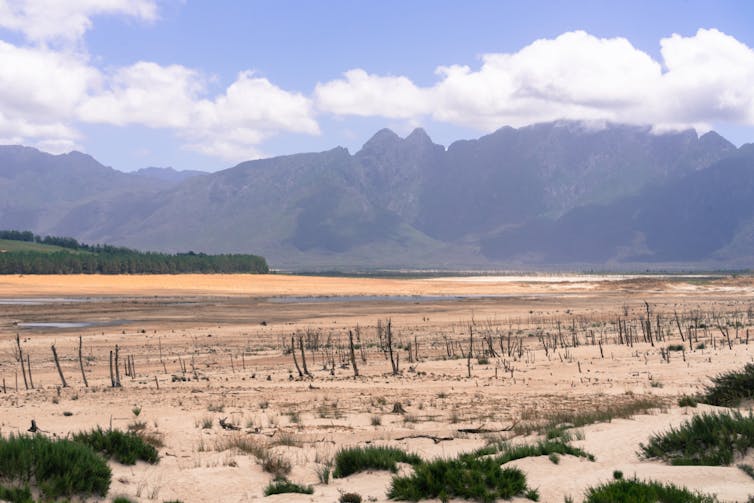

The dangerously low Threewaterskloof dam, a major supplier of water to the city. Photo: Shutterstock
By Leila Harris, Jiaying Zhao, and Martine Visser
Cape Town could become the world’s first major city to run out of water – what’s been termed Day Zero. Sao Paulo faced similar difficulties in 2015 leading to significant social unrest.
On Day Zero – which could be in mid-July if there’s no significant rain – residents of the city will have to travel to one of 200 city-wide collection points to get the allocated 25 litres per person, per day, under the watchful eye of an armed guard.
The city has done a great deal of work to manage water use, even winning multiple awards, although equity concerns have frequently been raised in relation to these efforts. In light of the ongoing drought, the city is now trying to encourage even stricter targets of 50 litres of water per person per day – a difficult goal that continues to raise issues of equity and justice.
To its credit, the city has worked with researchers at the University of Cape Town to test strategies to nudge domestic users into reducing their water use. Nudges are interventions to encourage behaviour change for better outcomes, or in this context, to achieve environmental or conservation goals.
What key insights could help inform the city’s strategies? Research from psychology and behavioural economics could prove useful to refine efforts and help to achieve further water savings.
The most effective tactics
Research suggests the following types of nudges could be effective in promoting conservation behaviours.
Social norms: International research, as well as studies conducted in Cape Town, suggest that effective conservation can be promoted by giving feedback to consumers on how they perform relative to their neighbours. To this end, Cape Town introduced a water map that highlights homes that are compliant with targets.
But concerns have been raised that this could lead to a backlash against homes that aren’t saving water. In light of these criticisms researchers are working with the city to evaluate the effectiveness of the map and how it compares to other strategies. For instance, might it be more meaningful to communicate information to individual households only, or to highlight successful performance at the neighbourhood level?
The city has also been bundling information on usage with easy to implement water saving tips, something that research has shown to be particularly effective.
Research also suggests that combining behavioural interventions with traditional measures – such as tariff increases and restrictions – are often effective to reduce use in the short-term.
Real-time feedback: Cape Town is presenting the daily water level in major dams on a dashboard. This approach is consistent with research that shows that real-time information can effectively reduce water and energy consumption.
Such efforts could even be more effective if information is highlighted in relation to the critical level that’s been set for Day Zero, in this case 13.5%.
In the early days of a drought, it is also advisable to make information like this readily accessible through news outlets, social media, or even text messages. The water tracker produced by eighty20, a private Cape Town-based company, provides an example.
Social recognition: There’s evidence that efforts to celebrate successes or encourage competition can be effective – for instance, recognising neighbourhoods for meeting conservation targets. Prizes needn’t be monetary. Sometimes simple recognition, such as a certificate, can be effective.
Social recognition was found to be the most successful intervention among nine others nudges tested in research conducted in Cape Town in 2016. In this experiment, households who reduced consumption by 10% were recognised on the city’s website.
Another study showed that competition between the various floors of a government building in the Western Cape led to energy savings of up to 14%.
Cooperation: In the months ahead, the city would also do well to consider the support it might offer to encourage cooperation, particularly as the situation becomes more acute and as tensions rise.
Past studies have shown that social reputation and efforts to promote reciprocity can go a long way to encourage cooperation. The point is argued in a recent article featuring the importance of cooperation among Capetonians across different income groups.
Some residents of Cape Town are already pushing for a cooperative approach such as helping neighbours who might have difficulty travelling to collection points. Support for these efforts should be an important part of policies in the run up to Day Zero. These are often the examples that provide bright spots in challenging times.
Research also suggests that to navigate moments of crisis effectively, clear and trustworthy communication is critical. This also needs to be a priority.
A positive strategy
![]()
![]()
This article was written by Leila Harris, Associate Professor, IRES, Institute for Gender, Race, Sexuality and Social Justice, University of British Columbia; Jiaying Zhao, Assistant Professor, University of British Columbia; and Martine Visser, Professor in the School of Economics, University of Cape Town.
It was originally published on The Conversation. Read the original article.


